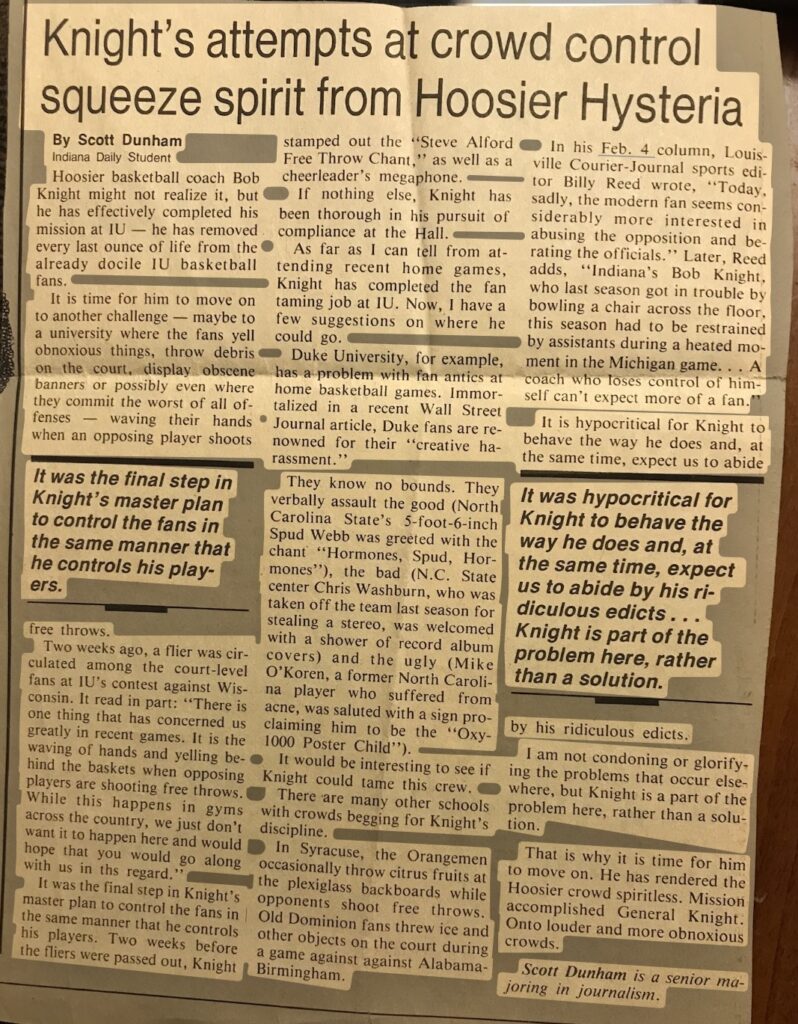When I was a journalism major at Indiana University from 1982 to ’86, nobody loomed larger on the Bloomington campus than Bobby Knight, the legendary basketball coach who died Wednesday at the age of 83. That era was the height of Knight’s “reign.”
His teams won three national championships. His 1976 team is the last to go undefeated for the entire season. “The General” currently stands sixth all-time in men’s college basketball victories (902). He coached an Olympic team to a gold medal. At the peak of his popularity, Knight could easily have been elected Indiana’s governor, Tippecanoe County notwithstanding. But his dark side eventually derailed him.
For a good part of his coaching career, Knight vigorously derided most of the members of the press. He deemed the Fourth Estate ignorant about basketball and treated them with disdain. Student reporters on the basketball beat for the Indiana Daily Student would dutifully return to the newsroom with micro-cassette tapes of Knight’s press conferences to transcribe. The recordings were full of profanity and nastiness.
No matter. Reporters, both students and professionals, dutifully sang Knight’s praises and even reported many of the negative things he had to say about them. It was Indiana’s version of Stockholm syndrome. For thousands of IU basketball fans, his brilliant coaching and winning ways were enough to cancel out a violent temper and a rage he could not control. Ironically, for a coach who demanded discipline from his players, he could not meet the high standards himself.
IU basketball tickets were tough to get during my four years in Bloomington. IU was coming off their 1981 national championship, Knight’s second, with Isiah Thomas leading the way. Students could purchase only half-season tickets, with a chance to purchase the other half if they didn’t sell out. I attended most of the home games all four years. I was a big fan. But Knight’s demeanor and anti-press antics didn’t sit well with me as an aspiring journalist.
In 1986, Knight decided to expand his control from the basketball court to the stands. He had the ushers circulate fliers at the Wisconsin game telling the fans behind the baskets that they were not to wave or create distractions when the opposing team shot free throws.
That got my dander up. I wrote a facetious column stating that Knight had gone too far. It got the biggest (read: most negative) reaction of anything I wrote for the IDS. In a perverse way, it was enjoyable even as my friends and people on campus mocked me for criticizing Knight. It seemed as long as Knight’s teams won, almost any behavior on his part was acceptable, by the fans and the university administration.
I was in an apartment complex in 1985 across the street from Assembly Hall on the day of the infamous chair toss. I didn’t have a game ticket. My jaw dropped as I watched it on television. It was a sign of worse to come, even though the 1987 national championship still lay ahead. Knight showed little remorse for the embarrassment he caused himself and the university. He eventually turned it into a story about trying to help an old lady at the game find a seat on the sidelines. One of the bars in Bloomington routinely showed the video of the chair toss, and it always got a raucous reaction from the patrons.
Back in South Bend after college graduation, I continued to watch and root for IU men’s basketball. Of course, no sooner did I depart from Bloomington, than the team won what would be (to this date and the foreseeable future) its last national championship with Steve Alford’s sharpshooting and Keith Smart’s poster-worthy corner shot for the game winner.
Although there were some Big Ten conference championships to come, IU only made one other serious run at a national title under Knight in 1992. The sideline confrontations seemed to increase. Rumors about player abuse surfaced. The players seemed to bristle more under Knight’s my-way-or-the-highway coaching style.
In 1997 came the Neil Reed choking incident, followed by an encounter with a student who addressed the coach as “Knight,” which angered him enough to violate rules of the zero-tolerance policy the university had imposed on him. Knight was dismissed in 2000. For twenty years he refused to say anything in public about Indiana University. He wouldn’t even say the word “Indiana.” He was a world-class grudge holder. He refused to set foot on the Bloomington campus. Although subsequent IU coaches reached out to him, he did not relent.
In 2019, Knight moved back to Bloomington. He resurfaced at an IU baseball game. He seemed frail and had the look of a lost person with dementia. Gone was the fearsome bully of the sidelines. A thawing of hard feelings seemed to be possible.
With Knight back in town, some of his all-time favorite players began the effort to convince him to become a part of the program he helped build and bring to national prominence. In February 2020, Knight returned to the Assembly Hall basketball court bearing his name. He was surrounded by dozens of former players. It was a fitting coda.
Although Knight did not speak to the 17,000 fans, his face spoke volumes. He was as close to crying as I have ever seen him. Weakened by age and dementia, any pretense of being the whip-wielding, phone and clipboard smashing, referee-berating bully was gone. It seemed that all was forgiven on both sides. I’m glad Knight, his players, and IU basketball fans got that moment before Covid-19 shut college basketball and the world down.
In a final irony, Knight died on All Saints’ Day. God apparently does have a sense of humor.

